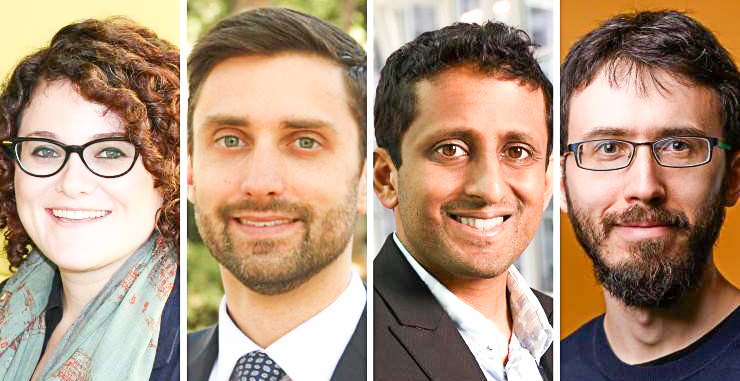Every year, the Alfred P. Sloan Foundation awards 126 researchers with two-year fellowships to recognize promising early-career researchers. This year, four are from Georgia Tech and Emory.
“Sloan Research Fellows are the best young scientists working today,” said Adam F. Falk, president of the foundation. “To be a Sloan Fellow is to be in the vanguard of twenty-first-century science.”
Open to scholars in eight scientific and technical fields, candidates are nominated by other scientists before being selected by independent panels of senior scholars. Winners receive a two-year, $70,000 fellowship to further their research.
“It’s recognition from the community,” said Matthew McDowell, one of the fellows and assistant professor in the schools of materials science and mechanical engineering. His research focuses on understanding how materials for storing energy change or degrade over time.
“Technological progress in this area could be really important to society,” he added. Challenges like climate change partly stem from an inability to efficiently store the energy that renewable sources provide. Moreover, understanding how to prevent the type of battery degradation consumers see in their smartphones would further help electronics and power grids alike. ”As a materials engineer, I thought I had an important role,” McDowell explained, and awards like the Sloan Fellowship help continue the research that McDowell and the other three fellows work on.
Eva Dyers, an assistant professor in the Wallace H. Coulter Department of Biomedical Engineering at Tech and Emory University, combines machine learning, optimization, and neuroscience in her research. Her lab specifically develops computational methods for better understanding of the principles governing the structure of the brain and how its structure and function are linked.
Chethan Pandarinth is an assistant professor in the same department as well as in Emory’s Department of Neurosurgery and their Neuromodulation Technology Innovation Center. He leads the Systems Neural Engineering Lab and studies how neurons in the brain encode information.
Konstantin Tikhomirov is an assistant professor in the School of Mathematics whose research over the geometry of high-dimensional sets applies in analyzing large systems of linear equations, modeling communication networks and understanding physical systems with large numbers of particles.
Tech prides itself in “Creating the Next” through its student programs, and with a faculty considered the next generation of scientific leaders, it may very well accomplish that.
